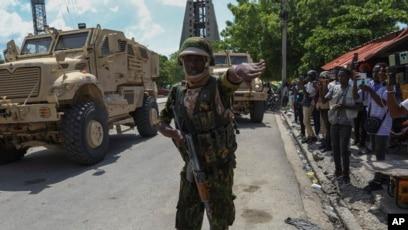Haiti has called for the deployment of a new international peacekeeping force and demands reparations from France, marking a significant escalation in the Caribbean nation’s ongoing quest for stability and justice. The appeal, highlighted in recent statements at the United Nations, underscores Haiti‚Äôs urgent need for external support amid escalating violence and political unrest. Additionally, demands for reparations revive longstanding historical grievances tied to Haiti’s colonial past, bringing renewed international attention to the nation’s complex relationship with its former colonizer.
Haiti Calls for Deployment of a New International Peacekeeping Force Amid Rising Security Concerns
Amid escalating violence and political instability, Haitian authorities have formally requested the international community to initiate the deployment of a new peacekeeping mission. The proposed force aims to address the surge in gang-related activities, kidnappings, and widespread insecurity that has paralyzed daily life for millions. Haitian officials emphasize that the current security apparatus has been overwhelmed, urging immediate and collaborative intervention to restore order and public safety.
Simultaneously, the Haitian government has reopened calls for reparations from France, drawing a direct connection between historical injustices and present-day challenges. The demands highlight:
- Financial compensation for damages stemming from colonial exploitation and the independence debt imposed in the early 19th century
- Support for sustainable development projects aimed at rebuilding infrastructure and social services
- International acknowledgment of past wrongs as a foundation for forging a new partnership based on equity
| Key Issue | Details |
|---|---|
| Security Force Size | 5,000 international peacekeepers proposed |
| Primary Objectives | Crime reduction, humanitarian support, stabilization |
| Reparations Requested | $21 billion, infrastructure and social investment |
| Expected Deployment Timeline | Within six months pending international consensus |
Demand for Reparations from France Highlights Historical Injustices and Economic Impact
Haiti’s call for reparations reflects a growing global acknowledgment of the profound consequences rooted in colonial exploitation. For over two centuries, the Caribbean nation has grappled with economic devastation following the indemnity imposed by France in the 19th century. This enforced payment not only drained Haiti’s nascent economy but also hindered its development, creating cycles of poverty that ripple through generations to this day.
Key demands from Haitian leaders emphasize:
- Financial compensation to offset the heavy debt burden inherited from colonial indemnities.
- Official recognition of historical injustices perpetrated during and after colonial rule.
- Support for sustainable development programs aimed at rebuilding infrastructure and economic stability.
| Impact Area | Historical Factor | Long-term Effect |
|---|---|---|
| Economy | Indemnity Payments | Heavy debt and stagnation |
| Social Fabric | Colonial Oppression | Inequality and social unrest |
| International Relations | Post-Independence Isolation | Limited foreign aid and investment |
UN Officials Emphasize Need for Multilateral Support to Stabilize Haiti
UN officials have called for an urgent multilateral response to Haiti’s ongoing crisis, highlighting the critical need for coordinated international support. The calls come amid Haiti’s demand for the deployment of a new international stabilization force capable of addressing the country’s escalating violence and political instability. UN representatives emphasize that isolated efforts will be insufficient without broad cooperation involving regional actors, international partners, and UN agencies working in unison to restore security and foster sustainable development.
In parallel, Haiti‚Äôs government has put forward a formal request for reparations from France, citing historical injustices dating back to the colonial era and their lasting impact on the nation’s socio-economic challenges. The demand underscores the complex blend of historical grievances and contemporary difficulties hindering Haiti‚Äôs progress. Below is an overview of key international stakeholders and their proposed roles in Haiti’s stabilization efforts:
| Stakeholder | Role | Focus Area |
|---|---|---|
| United Nations | Coordination & Support | Security, Humanitarian Aid |
| France | Dialogue & Reparations Negotiations | Historical Accountability |
| Regional CARICOM States | Peacekeeping & Mediation | Security & Political Stability |
| International Financial Institutions | Economic Assistance | Recovery & Development |
Experts Recommend Comprehensive Approach Combining Aid, Security, and Justice Initiatives
Leading international experts stress that addressing Haiti’s ongoing crisis requires a multi-dimensional strategy that integrates humanitarian aid, security reform, and judicial accountability. Immediate relief efforts, while critical, must be paired with sustainable development programs and robust security measures to restore public trust and social order. This includes deploying a newly mandated international force equipped to protect vulnerable populations and infrastructure, specifically tailored to address the complex challenges Haiti faces today.
Alongside security interventions, calls for justice initiatives are gaining momentum. Experts emphasize the necessity of transparent legal processes and reparations to redress historical grievances, particularly focusing on France’s colonial legacy which many Haitians cite as a root cause of persistent inequities. Key components highlighted include:
- Humanitarian assistance: Food, healthcare, and emergency shelter with community involvement.
- Security reform: Training and oversight of local law enforcement in tandem with international peacekeepers.
- Judicial accountability: Establishing independent courts and truth commissions.
- Historical reparations: Financial and institutional compensation addressing colonial-era imbalances.
| Initiative | Focus Area | Expected Outcome |
|---|---|---|
| International Force Deployment | Security & Protection | Reduce violence, protect civilians |
| Justice Reform Programs | Rule of Law | Strengthen judicial independence |
| Reparation Mechanism | Historical Accountability | Promote reconciliation & equity |
Wrapping Up
As Haiti calls for a new international force and demands reparations from France, the unfolding developments underscore the country’s ongoing struggle for justice and stability. The international community now faces mounting pressure to respond to these escalating appeals, highlighting the complex legacy of colonialism and the urgent need for effective support in Haiti. How governments and global institutions address these demands in the coming weeks may prove pivotal for Haiti‚Äôs future trajectory.




